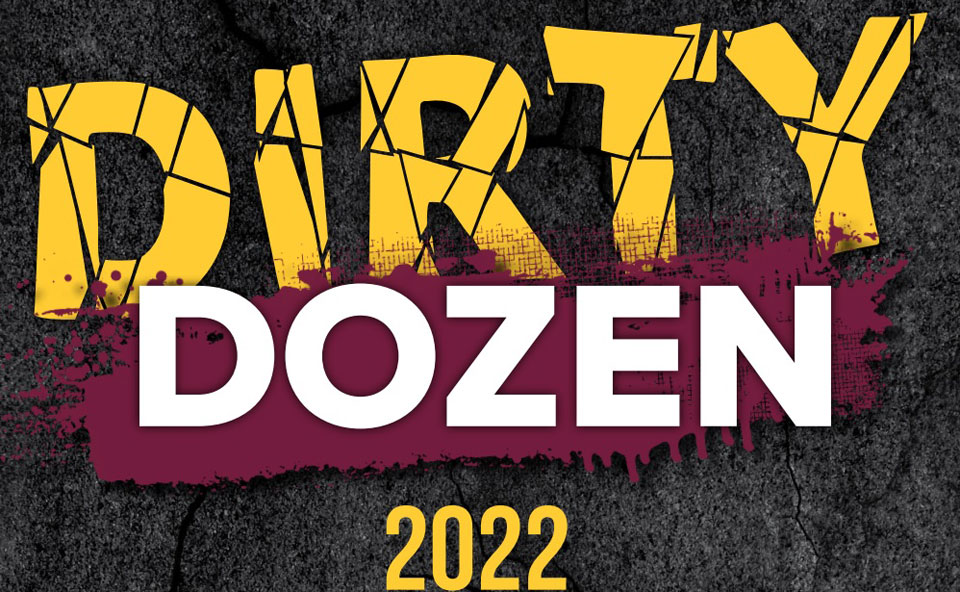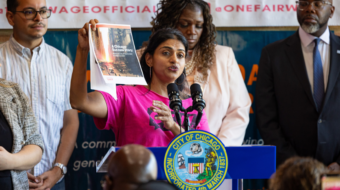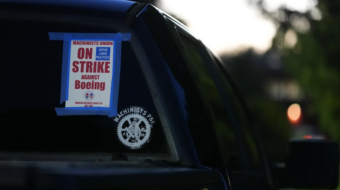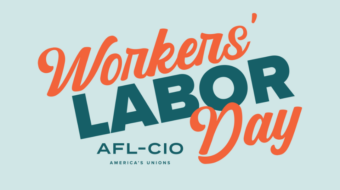
Exploitative service companies, from Amazon and Starbucks down to the Refresco bottling plant in New Jersey, dominate this year’s “Dirty Dozen” list of firms representing the universe of the nation’s worst companies for worker job safety and health.
And, not coincidentally, workers at quite a few of those violators are organizing to protect themselves. After all, past studies have shown that corporate law-breakers on job safety are often corporate law-breakers when it comes to workers’ rights, too.
“In some workplaces, (worker) health and safety is a true priority, not just a poster on a wall,” Jessica Martinez, co-executive director of the National Council for Occupational Safety and Health, which released the report, available at www.nationalcosh.org.
But too often, as ex-Starbucks worker Nikki Taylor of Memphis, Tenn., said, “As far as safety goes, they (firms) haven’t done anything.”
“This really speaks to the lack of any standards” for protecting workers, Martinez promptly responded. “They’re keeping workers in enslaved conditions.”

The report, unveiled April 27, the day before Workers Memorial Day, does not paint a pretty picture of the state of workers’ safety and health in the U.S.
It also buttresses, with workers’ stories, the AFL-CIO’S Death On The Job annual report, filled with figures, data and policy recommendations, released April 26. That report, in its 31st edition, contains policy specifics and history and provides a big picture–through numbers of worker protections–or lack of them (see DOTJ report story).
But 52 years after labor agitation and lobbying, led by the late Tony Mazzocchi of the Oil, Chemical and Atomic Workers, led to enactment of the Occupational Safety and Health Act, this report is yet another call for mobilization for the cause. Some of the reasons why:
- Conditions in Amazon’s big warehouse in Bessemer, Ala., are awful for workers, said Jennifer Bates, now a worker activist and a key player in the Retail, Wholesale and Department Store Union’s organizing drive there. RWDSU is awaiting the outcome of a contested election in Bessemer. The result will depend on 416 challenged ballots, greater than the margin—fewer than 200 votes—Amazon has over her union.
The worst case she saw, was literally when a worker died on the job, one of six who has perished at Bessemer since she began there in May 2020. The worker had collapsed outside a restroom, and after attempts at revival, an ambulance was called.
“Not once did Amazon ever acknowledge the deaths, or send a message” to workers “saying ‘We lost a soldier.’ We hosted a memorial vigil. They wouldn’t even release the name.”
Amazon also never acknowledged the deaths of five workers in its warehouse in Edwardsville, Ill., when a tornado roared through earlier this year, flattening the structure, one questioner noted.
Amazon also tries to strong-arm workers into returning to their posts—which involve hours on end of standing or shoving heavy parcels around the plant—even when they were hurting, Bates said. Their solution for workers who are limping, aching or worse: “Ice packs, heat pads and Ibuprofen.”
The firm’s terrible safety record led Bates and her colleagues to organize with RWDSU in Bessemer. And safety conditions—exposure to the coronavirus with no company protection—were a catalyst for the independent Amazon Labor Union to organize the firm’s JFK8 warehouse in Staten Island, N.Y., where it convincingly won the union recognition vote.
- The same thing’s happening in Starbucks stores, said Taylor, the former Memphis worker. The firm fired her for her activism with Workers United, a Service Employees sector. The National Labor Relations Board has ruled her firing was illegal retaliation, but she’s awaiting reinstatement, with net back pay—the NLRB’s maximum penalty.
Taylor and six other Memphis workers “were terminated three weeks from the date we petitioned” to the NLRB for the union recognition vote in Memphis. “One of our main reasons: Live wires were hanging around. Several days ago, the store caught fire. And there were broken tiles on the floor. One worker tripped and broke her ankle. The tiles are still broken.”
She reported Starbucks’s reaction, too: They cater to the customers, without protecting workers. That’s what’s happened, she added, when coronavirus restrictions eased on retail firms. “As soon as customers started complaining about Covid (coronavirus) safety protocols, they (Starbucks) took them away.

“I was exposed to someone on the job with Covid. Even though I had been vaccinated,” she said. Taylor caught a slight case, was asymptomatic, brought it home—and without knowing it, infected her 8-year-old daughter, “who had a 102-degree fever.”
The Starbucks workers’ reaction nationwide: Organizing drives, and wins, from coast to coast. The latest two victories, within the several days were in the D.C. suburbs and in a well-off neighborhood just north of downtown Baltimore, 14-0.
- Murder is a threat, too, said Mary Gundel, a former Dollar General manager in Tampa, Fla. The firm fired her after her video on dangers at the store—where workers must solo, often overnight–went viral on TikTok.
“In my district, a store manager was terminated for not following company protocol—‘Put in a ticket’ to report an incident—for herding people into an office to avoid an armed robbery. The manager called police. Dollar General had deliberately locked other exit doors. Police responded, and had to shoot the robber,” she said.
“In three years on the job, I’ve had things thrown at me, I’ve been pushed, I’ve been shoved, I’ve had a knife pulled on me, and I was almost kidnapped in the parking lot,” after finishing her shift. The company’s response is always “put in a ticket.”
There are no responses to the tickets, Gundel noted.
But Dollar General’s health and safety record is so bad, the report says, that it’s had to fork over $3.6 million in fines to the Occupational Safety and Health Administration for repeat job safety violations.
In many cases, the workers are fighting back by unionizing. That’s happening at Starbucks, Amazon, and Refresco, among others.
In Amazon’s case, the workers are organizing with the independent Amazon Labor Union in Staten Island, N.Y., and the Retail, Wholesale and Department Store Union. Workers United, a Service Employees sector, keeps winning union recognition votes at Starbucks stores, with the latest triumphs in Baltimore and the D.C. area. The Refresco plant employees are campaigning to join the independent United Electrical Workers.
“We worked 24 hours a day, seven days a week, even on holidays, through the pandemic,” worker Lydia Guevara said through an interpreter. “Thirty-five people got infected, and it was passed to me” even though she was vaccinated. She was asymptomatic, “but my son and family got it, too. At no time did Refresco let us know” about infected colleagues.
“The dollars don’t mean anything if your family isn’t safe.”

Other firms on the National COSH Dirty Dozen list include: Atlantic Coast Utilities of Boston, which lied about its safety record to get a city contract after two workers died in trench collapses, Dalkin America, of Decatur, Ala., where three workers died from toxic exposures, and the Foundation Food Group of Gainesville, Ga., where a nitrogen leak killed six workers, all Spanish-speaking immigrants.
Also named: Hilton Hotels, for endangering workers’ health by loading more work on, per shift, especially for female housekeepers and maids; Kingspan Light and Air of Santa Ana., Calif,., whose workers brought in the own air monitors, revealing a toxic atmosphere at a “green” firm; and the candle company in Mayfield, Ky., leveled by the same line of tornados which wrecked Amazon’s Edwardsville warehouse. Nine Mayfield workers died because supervisors refused to let them escape to safety.
A final one on the list: The Ernst Nursery and Farms in St. Paul, Ore., where a worker laying irrigation lines collapsed and died in 104-degree heat. AFL-CIO President Liz Shuler cited his demise days before, calling for measures to combat change. The nursery’s response, as quoted in the report: Each worker “must be accountable for how they push their body.”










